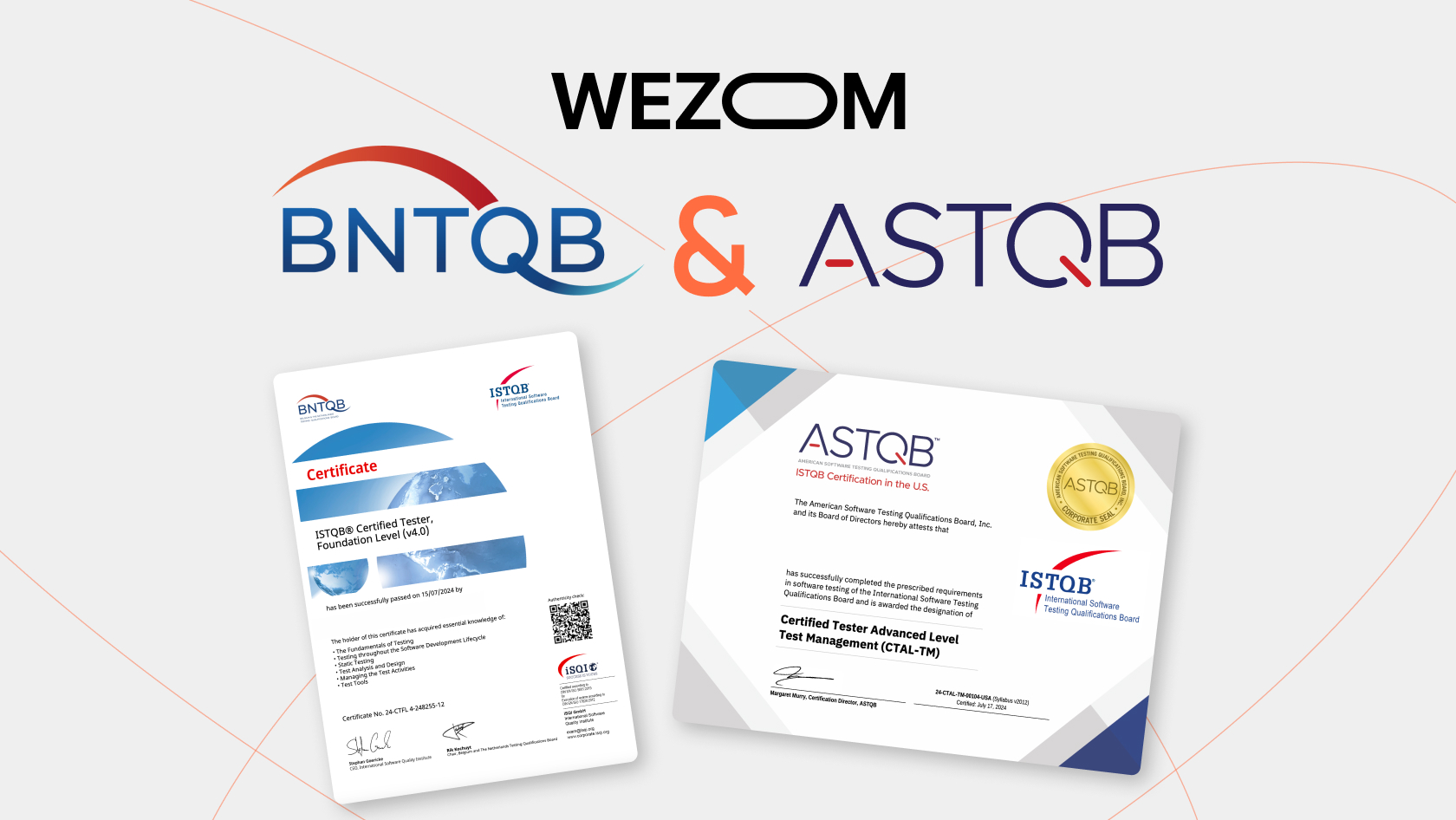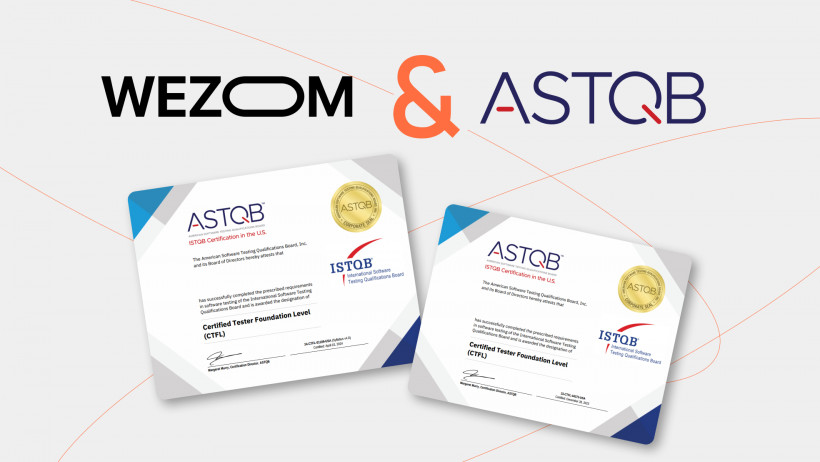We have great news today – we have become official ASTQB and BNTQB partners! Let’s find out what it means to our clients.
What Does This Partnership Mean?
The ISTQB exam is one of the most significant exams that confirms theoretical and practical skills in applying Agile, automation, and artificial intelligence in software testing. Obtaining this certificate allows us to become ASTQB and BNTQB partners and, thus, get into the Official U.S. List of Certified Software Testers™, which is used as a benchmark for real professionalism by many employers in the United States.
Why Is This So Important to Us?
As you may know, quality (i.e., compliance with specifications, standards, and generally accepted requirements) is one of the key factors providing the viability and competitiveness of a digital solution. Therefore, those who choose our software development services must be confident that we can ensure their products with this business value. And, since the ASTQB and BNTQB partnership is one of the most prestigious signs of QA expertise worldwide, we decided to get it whatever it takes.
What Our Specialists Who Received This Certification Say
We talked to some of our employees to learn more about the nuances of obtaining the ASTQB partnership.
We interviewed Natalia, Manual QA Tech Lead, and Alla, Middle Manual QA, and here are the answers we received.
How difficult was it to get this certification?
Natalia: The ISTQB Foundation Level certification was an interesting challenge to me. It required a lot of preparation and focus as it covers various topics fundamental to the QA engineering profession. However, although the material may seem difficult, systematic training and practical experience greatly simplify the assimilation of information. In general, certification is an excellent opportunity to test your own knowledge and skills in the field, which is important for professional confidence and career growth.
Alla: Generally, it wasn’t too difficult, and the exam had a test format.
What skills does this certification confirm?
Natalia: The ISTQB Foundation Level certification confirms knowledge of the basic principles of software testing. It emphasizes the importance of a structured approach to the testing process as a whole, from planning, designing, and executing tests to assessing their results and reporting.
Alla: This exam assessed my fundamental knowledge of the theory of testing and quality assurance. My practical skills in applying test design techniques were also evaluated.
July Update on Natalia's Certification Journey
After successfully completing the ISTQB Foundation Level certification in April, Natalia decided to immediately pursue the Certified Tester Advanced Level Test Management (CTAL-TM) certification.
Natalia: The ISTQB Foundation Level certification had a significant positive impact on my work, particularly through the new knowledge that allowed me to perform tasks more efficiently and improve testing quality. However, to achieve even better results and refine testing processes, i decided to gain deeper knowledge, especially in test management. This helped me better organize processes, plan and control them, and improve interaction with her team and stakeholders.
Skills validated by the certification:
- Advanced knowledge in test management.
- Ability to plan, assess, and control testing processes.
- Skills in managing a team of testers, allocating tasks, and monitoring their execution.
- Knowledge of risk management and making informed decisions in testing.
- Understanding of the financial aspects of testing, including budgeting and cost control.
- Ability to communicate effectively with other departments and stakeholders.
Plans for other certifications
Natalia: I plan to continue my professional development through further education and obtaining new certifications. I believe that continuous learning is key to maintaining high qualifications and competence in my field, although the specific next certification has not yet been determined.
Our Team didn't stop there!
Our Middle Manual QA Engineer, Hanna Spivachuk, has obtained the CTFL v4.0, the latest released version of the ISTQB® Certified Tester Foundation Level certification.

Here’s her feedback on obtaining the certification and why it matters:
What professional benefits does the ISTQB certification provide?
Hanna: The ISTQB certification is almost a mandatory certification that every tester in Europe and the USA should have. It demonstrates that the tester has knowledge of the basics of testing, including test planning, test analysis and design, test management, and leading techniques used in projects such as TDD, retrospectives, reviews, etc.
As stated on the official ISTQB website, after completing the certification, the certified individual (not necessarily a tester, as the certification is also useful for other roles in the project) has the following skills:
- Understanding what testing is and why it is useful
- Understanding fundamental concepts of software testing
- Ability to identify testing approaches and actions needed depending on the testing context
- Ability to assess and improve the quality of documentation
- Knowledge to increase testing efficiency and effectiveness
- Understanding the alignment of the testing process with the software development lifecycle
- Understanding the principles of test management
- Knowledge of writing and reporting clear and understandable defect reports
- Understanding factors affecting testing priorities and efforts
- Working in a cross-functional team
- Knowledge of risks and benefits of test automation
- Knowledge of basic skills needed for testing
- Understanding the impact of risks on testing
- Effective reporting on testing progress and quality
Was it difficult to handle the test, and how did it go?
Hanna: The test was conducted online under the supervision of a proctor: one camera from the laptop and another camera from the phone, directed at the hands on the keyboard. The test duration was 1 hour and 15 minutes, with 40 questions on comprehension and test design tasks. The internet interrupted a couple of times, which increased the tension.
Certification Through BNTQB
Hanna achieved this certification through BNTQB (Belgian National Testing Board), which is the national testing body and part of the international ISTQB® structure.
The primary role of BNTQB is to organize and conduct ISTQB® certification exams in Belgium, including the CTFL. Thus, BNTQB serves as the official ISTQB® representative in its country, ensuring the standardization and compliance of ISTQB® training programs and certification processes.
Why This Is Important
Thanks to our partnership with BNTQB, our company has the opportunity to improve our qualifications and adhere to the highest standards in the field of software testing.
Final Thoughts
We understand that a single certificate, even the most prestigious, cannot guarantee dozens of new contracts. We would just like our clients to have objective confidence that our experience and knowledge allow us to create high-quality and advanced solutions that can give a head start to even established leaders in their business niche.
Actually, the next sign of our team's reliability has become the ASTQB partnership. If you want to entrust us with your project completely or one of its stages, please contact us right now.
